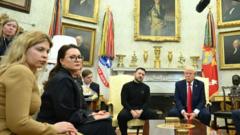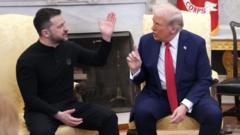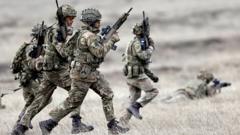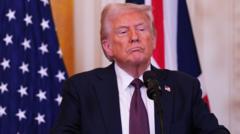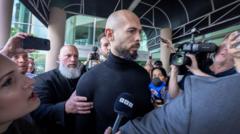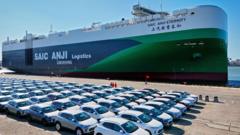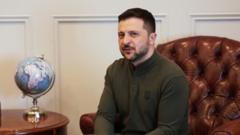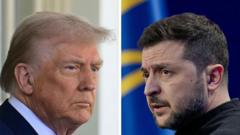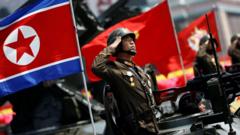With an upcoming peace deal in mind, Hegseth stresses need for European nations to increase defense spending and support Ukraine.
Hegseth Advocates Major Shift in European Defense Strategy
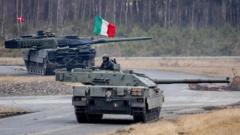
Hegseth Advocates Major Shift in European Defense Strategy
US Defense Secretary calls on NATO to shoulder burden amid Ukraine conflict
In a notable pivot regarding defense relations, newly appointed US Defense Secretary Pete Hegseth delivered a stern message to European nations during a recent defense summit in Brussels, asserting the importance of European countries taking on a greater fiscal responsibility for Ukrainian support. Hegseth indicated that the United States would no longer maintain what he described as an "imbalanced relationship" with its NATO allies, urging them to significantly boost their defense expenditures.
During his speech, Hegseth deemed it "unrealistic" for Ukraine to aspire to restore its territorial integrity to pre-2014 borders, suggesting that the pursuit of this goal might only perpetuate the ongoing conflict. His comments arrive as negotiations between Donald Trump and Vladimir Putin to seek an end to the war were reportedly initiated via a lengthy phone conversation. This marks the clearest indication yet of potential U.S. policy changes under Trump's leadership regarding the Ukraine war.
While Ukrainian officials have consistently advocated for NATO membership and outright rejected offers to cede land, Hegseth's statements could exacerbate tensions in Kyiv. The Secretary emphasized that Europe should now be responsible for the "overwhelming share" of military resources for Ukraine, as the U.S. plans to reduce its level of assistance.
“Securing European stability should be a top priority for NATO,” he asserted. Hegseth’s remarks included a call for NATO's European members to ramp up their military funding to 5% of their GDP by echoing previous criticisms of their current 2% target. This financial burden shifting presents a stark choice for European nations wrestling with their own defense logistics while dealing with the heavy toll of the conflict.
While Hegseth acknowledged the necessity of providing "robust security guarantees" to prevent further escalation of hostilities, he reiterated that NATO membership was not a feasible outcome, proposing instead that security assurances come from troops outside of NATO’s direct command.
In light of the renewed discussions for a potential peace agreement, Ukrainian President Volodymyr Zelensky expressed a willingness to negotiate from a strong position, hinting at ideas for a territorial exchange with Russia, while he also aimed to attract U.S. business investment for Ukraine’s reconstruction. However, skepticism remains regarding whether any diplomatic resolution could satisfy both Kyiv and Moscow under the current ambitions of leadership.
During his speech, Hegseth deemed it "unrealistic" for Ukraine to aspire to restore its territorial integrity to pre-2014 borders, suggesting that the pursuit of this goal might only perpetuate the ongoing conflict. His comments arrive as negotiations between Donald Trump and Vladimir Putin to seek an end to the war were reportedly initiated via a lengthy phone conversation. This marks the clearest indication yet of potential U.S. policy changes under Trump's leadership regarding the Ukraine war.
While Ukrainian officials have consistently advocated for NATO membership and outright rejected offers to cede land, Hegseth's statements could exacerbate tensions in Kyiv. The Secretary emphasized that Europe should now be responsible for the "overwhelming share" of military resources for Ukraine, as the U.S. plans to reduce its level of assistance.
“Securing European stability should be a top priority for NATO,” he asserted. Hegseth’s remarks included a call for NATO's European members to ramp up their military funding to 5% of their GDP by echoing previous criticisms of their current 2% target. This financial burden shifting presents a stark choice for European nations wrestling with their own defense logistics while dealing with the heavy toll of the conflict.
While Hegseth acknowledged the necessity of providing "robust security guarantees" to prevent further escalation of hostilities, he reiterated that NATO membership was not a feasible outcome, proposing instead that security assurances come from troops outside of NATO’s direct command.
In light of the renewed discussions for a potential peace agreement, Ukrainian President Volodymyr Zelensky expressed a willingness to negotiate from a strong position, hinting at ideas for a territorial exchange with Russia, while he also aimed to attract U.S. business investment for Ukraine’s reconstruction. However, skepticism remains regarding whether any diplomatic resolution could satisfy both Kyiv and Moscow under the current ambitions of leadership.

